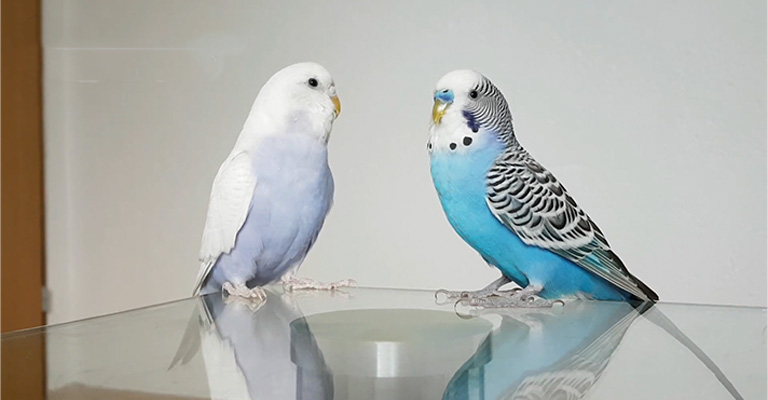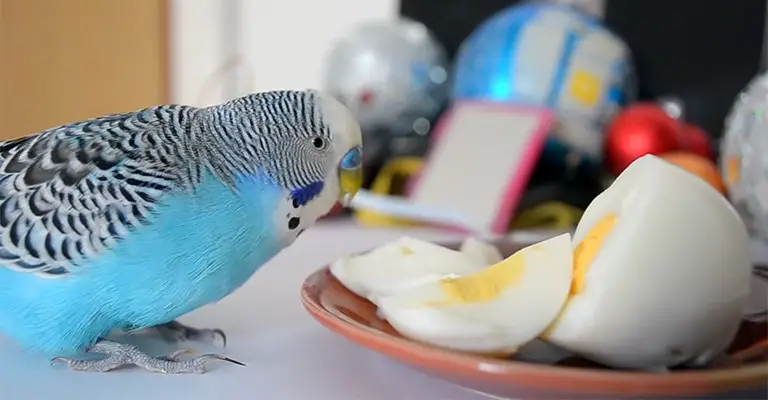The captivating world of budgerigars, or budgies, often brings with it a blend of curiosity and awe, especially when observing their intricate social behaviours.
Yet, when a female budgie displays resistance to the advances of a male counterpart for mating, it can raise questions about the dynamics of these avian relationships.
Understanding why is my female budgie not allowing male to mate-reasons and Solution requires delving into their natural instincts, health considerations, and environmental factors.
These aspects intersect to create a complex web of influences that shape their mating behaviours. Unravelling this puzzle can offer valuable insights into ensuring the well-being and harmony of these feathered companions.

Why Is My Female Budgie Not Allowing Male To Mate-Reasons
There are many possible reasons why your female budgie is not allowing your male budgie to mate. Here are some of them:
Age
Budgies need to be mature enough to breed but not too old. The ideal age range for breeding budgies is between 1 and 3 years old.
If your female budgie is too young or too old, she may not be interested or ready to mate with your male budgie.
Health
Budgies need to be healthy and fit to breed. If your female budgie is sick, injured, or stressed, she may not want to mate with your male budgie.
Some common health problems that affect budgies include respiratory infections, tumours, parasites, or injuries.
You can check your female budgie for any signs of illness or injury, such as sneezing, wheezing, coughing, bleeding, swelling, or loss of appetite. If you notice any of these signs, you should take your female budgie to a vet as soon as possible.
Diet
Budgies need a balanced and nutritious diet to breed. If your female budgie is not getting enough food or water, or if her diet is poor or inadequate, she may not have the energy or the desire to mate with your male budgie.
You should provide your female budgie with a variety of fresh fruits, vegetables, seeds, pellets, and cuttlebone. You should also avoid foods that are high in fat or sugar, such as nuts, honey, or chocolate.
Lighting
Budgies need a proper lighting schedule to breed. If your female budgie is exposed to too much or too little light, it may affect her hormonal cycle and her readiness to mate with your male budgie.
You should provide your female budgie with 12 hours of darkness and 12 hours of light each day. You should also cover her cage at night with a dark cloth to ensure she gets enough sleep.
Environment

Budgies need a comfortable and safe environment to breed. If your female budgie is not happy or secure in her cage or surroundings, she may not feel like mating with your male budgie.
You should provide your female budgie with a spacious and clean cage with enough perches, toys, and hiding places.
You should also avoid any sources of stress or disturbance, such as loud noises, sudden changes, predators, or other pets.
Nesting
Budgies need a suitable nesting site to breed. If your female budgie does not have a nest box or a place where she can lay her eggs and raise her chicks, she may not be willing to mate with your male budgie.
You should provide your female budgie with a wooden nest box that is large enough for her and her future offspring.
You should also line the nest box with some soft material, such as wood shavings, paper towels, or hay.
Compatibility
Budgies need a compatible partner to breed. If your female budgie does not like or trust your male budgie, she may not allow him to mate with her.
You should observe how your female and male budgies interact with each other. Do they preen each other, feed each other, cuddle each other, or sing together?
Or do they fight each other, bite each other, chase each other away, or ignore each other? By observing their behaviour, you can tell if they are compatible or not.
Timing

Budgies need the right timing to breed. If your female budgie is not in the mood or in the right phase of her cycle to mate with your male budgie, she may reject him.
You should look for signs that indicate that your female budgie is ready to breed. Some of these signs include having a brown cere (the fleshy area above the beak), being more vocal and active, rubbing her vent (the opening where the eggs come out) on perches or objects, lifting her tail in the air, and soliciting the male’s attention.
Personality
Budgies have different personalities and preferences. Some female budgies are more dominant or aggressive than others. Some female budgies are more choosy or picky than others.
Your female budgie may not allow your male budgie to mate with her simply because she does not like him or his approach.
She may have a different taste or style than him. She may want him to court her more or differently before she accepts him.
What Should I Feed My Female Budgies To Enhance Their Breeding Potential?

To enhance their breeding potential, you should feed your female budgies a balanced and nutritious diet that provides them with enough energy, protein, calcium, and vitamins.
Here are some items that you can feed your female budgies to improve their chances of breeding successfully:
Seeds
Seeds are the staple food of budgies, and they provide them with essential fatty acids, carbohydrates, and minerals.
However, seeds alone are not enough for your female budgies, as they are high in fat and low in protein and calcium. You should limit the amount of seeds you give to your female budgies to about 10% of their daily intake.
You should also choose a good quality seed mix that contains a variety of seeds, such as millet, canary seed, oats, sunflower seeds, and safflower seeds.
Pellets
Pellets are especially beneficial for your female budgies, as they provide them with enough protein and calcium to produce healthy eggs and chicks. You should make pellets the main part of your female budgies’ diet, about 70% of their daily intake.
You should also choose a high-quality pellet brand that is specially formulated for budgies, such as Harrison’s, Roudybush, or Zupreem.
Fruits
Fruits are a great source of vitamins, antioxidants, and water for your female budgies. Fruits can help boost your female budgies’ immune system and prevent diseases.
Fruits can also add some variety and flavour to your female budgies’ diet. You should offer your female budgies fresh or dried fruits every day, about 5% of their daily intake. You should also wash and chop the fruits before giving them to your female budgies.
Some fruits that are safe and healthy for your female budgies include apples, bananas, berries, grapes, kiwis, mangoes, melons, oranges, papayas, peaches, pears, pineapples, and plums.
Vegetables
Vegetables are another source of vitamins, minerals, and fibre for your female budgies. It can help improve your female budgies’ digestion and metabolism.
Vegetables can also provide your female budgies with some natural colour enhancers and pigments. You should offer your female budgies fresh or cooked vegetables every day, about 15% of their daily intake.
Some vegetables that are safe and healthy for your female budgies include broccoli, cabbage, carrots, cauliflower, celery, corn, cucumber, kale, lettuce, peas, peppers, spinach, squash, sweet potato, tomato, and zucchini.
Cuttlebone
Cuttlebone is a hard and chalky substance that comes from the internal shell of cuttlefish.
Calcium is essential for your female budgies’ bone health and egg production. It can also help keep your female budgies’ beaks trim and sharp.
You should provide your female budgies with a cuttlebone in their cage at all times. You should also replace the cuttlebone when it becomes worn out or dirty.
Mineral Block
Mineral block is a solid block that contains various minerals and salts for your female budgies.
Mineral block can also help keep your female budgies’ beaks trim and sharp. You should provide your female budgies with a mineral block in their cage at all times. You should also replace the mineral block when it becomes worn out or dirty.
Egg Food
Egg food is a special food that contains cooked eggs and other ingredients for your female budgies.
You should offer your female budgies egg food once or twice a week during the breeding season. You should also remove any leftover egg food after a few hours to prevent spoilage.
Sprouted Seeds
Sprouted seeds are seeds that have been soaked in water until they germinate or sprout. Sprouted seeds can also help improve your female budgies’ digestion and immunity.
You should offer your female budgies sprouted seeds once or twice a week during the breeding season. You should also rinse and drain the sprouted seeds before giving them to your female budgies.
Millet Spray
Millet spray is a bunch of millet seeds that are still attached to the stem. Millet spray is a tasty and fun treat for your female budgies.
You should offer your female budgies millet spray once or twice a week as a reward or a supplement. You should also hang the millet spray in their cage or hold it in your hand for them to nibble on.
FAQ
Female budgies can be choosy about their mates. They might not be receptive due to stress, discomfort, or not forming a strong bond with the male. A lack of compatibility or readiness can also be a factor.
Yes, underlying health problems can affect a budgie’s behaviour. Illness, discomfort, or pain might make the female budgie uninterested in mating. Consult an avian veterinarian if you suspect health issues.
Absolutely. Budgies need a strong bond before mating. If they haven’t spent enough time together or haven’t established trust, the female might reject the male’s advances. Gradual introductions and social interactions can help build this bond.
An unsuitable or stressful environment can deter mating. Loud noises, disturbances, or lack of privacy might make the female budgie uncomfortable.
Provide a quiet, secure space with proper nesting materials to encourage natural mating behaviours.
Ensure both budgies are healthy and comfortable in their environment. Give them time to bond through shared activities and interactions.
Offer nesting materials and create a peaceful atmosphere. If they’re not receptive, avoid forcing them, as it could stress them further.
Conclusion
The enigmatic scenario of a female budgie rejecting a male’s mating advances is a reminder of the intricate interplay between nature and nurture in the avian world.
From health concerns and inadequate bonding to environmental stressors, various factors can contribute to such behavioural patterns.
As responsible caretakers, it is essential to provide a conducive environment that prioritizes the emotional and physical needs of both budgies. Patience, observation, and providing opportunities for natural courtship can aid in fostering a strong bond between these birds.
Ultimately, by addressing the underlying causes of the female budgie’s reluctance to mate and implementing appropriate solutions, we can nurture a harmonious and fulfilling companionship between these captivating creatures.